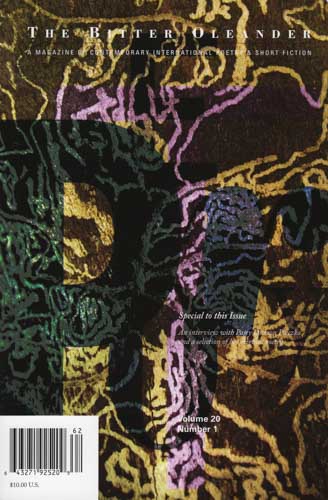The Bitter Oleander – Spring 2014
The Spring 2014 issue of The Bitter Oleander is like a smorgasbord laden with curious-looking food that you’re not sure you would like, and which even seem a little intimidating. But egged on by your adventurous spirit and that childhood admonition at the dinner table—you don’t have to like everything, but you ought to try everything—you pick it up and discover that the rewards can be great indeed. The magic lies in the deft mix of the accessible and the unfamiliar, in the selections as a whole as well as in the individual pieces. The Spring 2014 issue of The Bitter Oleander is like a smorgasbord laden with curious-looking food that you’re not sure you would like, and which even seem a little intimidating. But egged on by your adventurous spirit and that childhood admonition at the dinner table—you don’t have to like everything, but you ought to try everything—you pick it up and discover that the rewards can be great indeed. The magic lies in the deft mix of the accessible and the unfamiliar, in the selections as a whole as well as in the individual pieces.
The issue is heavy on poems, especially poems in translation. The Bitter Oleander made the wonderful decision to include the originals on the facing pages, a boon to readers who speak the language but also to those who don’t; without the distraction of meaning, those readers may even be more sensitive to the shape and sounds of the language.
According to Wikipedia, only about 70,000 people would understand Mikeas Sànchez’s “Branch” in its original Zoque, spoken by the Zoque indigenous people in southern Mexico. It is tense and erotic, shattering any preconceptions of a constricted, insular, or one-dimensional “indigenous culture” and the limits of their languages. As rendered by the translator David Shook:
To be free is to sleep naked
without hands seeking your sex
she thinks a thousand times
while she closes her eyes
and dreams she’s on a street in Dakar
with a dozen young black women
newly arrived at puberty
each one rehearses ancestral canticles in Wolof
each one is a wild gull
circling desire
The translations range from the historical (Esther Dischereit’s “German Lied,” translated from the German by Iain Galbraith) to the visceral (Salgado Maranhão’s “Pré-Logos,” translated from Portuguese by Alexis Levitin) to the pastoral and whimsical (Salvador Novo’s “Landscape” and “Voyage” translated from Spanish by Anthony Seidman). Seidman also contributes three of his own poems, desperate, lonely, and nonetheless gripping pieces.
The feature on Patty Dickson Pieczka includes an interview and twenty poems. Pieczka notes that her voice was “condensed and extremely visual,” and that she sometimes “saw poems before hearing or feeling them.” The original but accessible images weave entire emotional worlds: “Night cools the flaming hours / like hot marbles / cracking in a pan” (“What Lives in the Dark”); “The sky is inverted, / a tunnel, a well, / the moon its only opening” (“After the Argument”); “to pull your voice up / against my chin and blanket / myself beneath it” (“Through This Ice-Veined Window”). These are quotidian poems, their landscapes easily recognizable and relatable.
The fiction is similar in style, with experimental exteriors peeling back to reward the patient reader with a kernel of warmth. The pistol is the narrator in Lenny Levine’s “Glockenspiel”; its gleeful and therefore chilling voice makes fresh what could have been an utterly predictable story. The languid pace in Jean-Luc Beaudry’s “In the Country” belies the violent undercurrent, and in the end the reader is jolted by its explosion several seconds after it occurs and with a sense that the situation is irremediable. Jason Lee Brown’s “Free Alcohol” paints a picture of an alcoholic through a page-and-a-half monologue of his girlfriend (although she seems somehow omniscient and requires the reader to constantly rework her identity). It manages to be funny and depressing at the same time.
The Bitter Oleander is for the reader who is looking for more exposure to translated work than the average journal offers and just the right mix of friendliness and experimentation. You may not like everything you tried this time, but you wouldn’t regret having tried it, and you’ll be curious about what’s offered next.
[www.bitteroleander.com]





